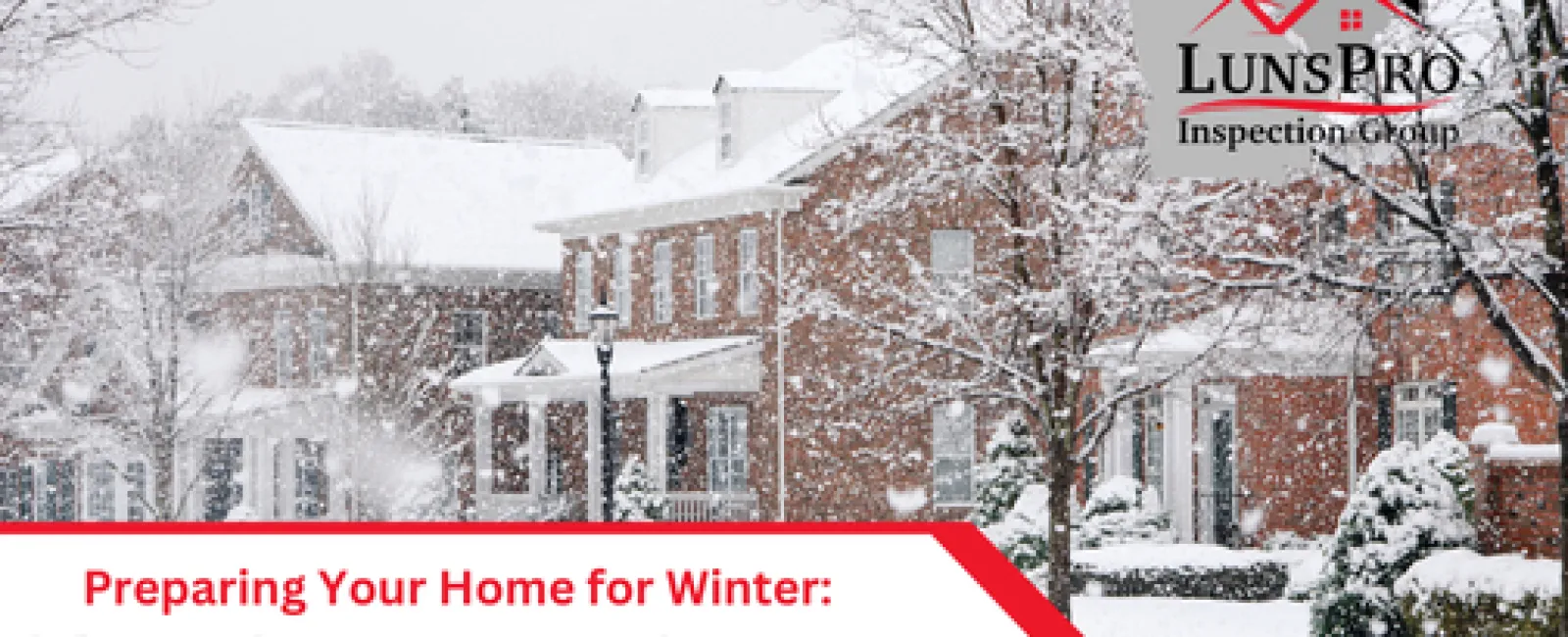As the days grow shorter and the temperatures begin to drop, it's time to start preparing your home for the winter months ahead. Winterizing your property isn't just about keeping warm; it's also essential for protecting your home from potential damage caused by cold weather, ice, and snow. Taking proactive steps now can save you from costly repairs and ensure your home remains safe and comfortable throughout the season.
At LunsPro Inspection Group, we know the value of a thorough inspection to identify potential vulnerabilities in your home before winter arrives. Whether you're scheduling Carolina residential and commercial inspections or seeking expert guidance in North Carolina home inspections, this article will provide you with key insights into winter preparation and highlight the areas you should prioritize.
Why Winterizing Your Home Is Essential
Winter can take a toll on even the most well-maintained homes. Freezing temperatures, snow, and ice can lead to structural damage, plumbing issues, and energy inefficiency. Taking steps to prepare your home before the cold weather sets in is crucial for several reasons:
Prevent Costly Repairs: Identifying and addressing small problems now can prevent them from turning into expensive issues later.
Improve Energy Efficiency: Proper insulation, sealing, and maintenance can lower your heating bills and reduce your carbon footprint.
Enhance Safety: Winterizing your home reduces the risk of accidents caused by icy walkways, faulty heating systems, or power outages.
With these benefits in mind, let's dive into the key areas you should inspect and prepare for winter.
Key Areas to Inspect and Prepare
1. Roof and Gutters
Your roof and gutters are your home's first line of defense against snow and ice. Before winter begins, take the following steps:
Inspect the Roof: Check for missing or damaged shingles, leaks, and areas where water could pool. A professional inspection from LunsPro Inspection Group can identify hidden issues that may not be visible from the ground.
Clean Gutters and Downspouts: Remove leaves and debris to prevent clogs that can lead to ice dams and water damage. Ensure that downspouts direct water away from the foundation.
Trim Overhanging Branches: Prevent branches from breaking under the weight of snow and damaging your roof.
2. Windows and Doors
Drafty windows and doors can significantly impact your home's energy efficiency. Inspect these areas carefully:
Seal Gaps and Cracks: Use weatherstripping or caulk to seal gaps around windows and doors.
Install Storm Windows: If your home has storm windows, install them before winter to add an extra layer of insulation.
Inspect Locks and Hinges: Ensure all locks and hinges are functioning properly to maintain security and prevent drafts.
3. Heating System
Your heating system will be working overtime during the winter months. Make sure it's ready for the challenge:
Schedule a Professional Inspection: An HVAC technician can inspect and service your furnace or heat pump to ensure it's running efficiently.
Replace Filters: Clean or replace filters to improve airflow and indoor air quality.
Check Vents and Ducts: Ensure vents and ducts are clear of obstructions and properly sealed to prevent heat loss.
4. Plumbing
Frozen pipes can cause significant damage and costly repairs. Protect your plumbing system by taking these steps:
Insulate Pipes: Wrap pipes in unheated areas with foam insulation to prevent freezing.
Drain Outdoor Faucets: Disconnect and drain hoses, and shut off the water supply to outdoor faucets.
Locate the Main Shut-Off Valve: Know where your home's main water shut-off valve is located in case of an emergency.
5. Insulation and Ventilation
Proper insulation and ventilation are key to maintaining a comfortable and energy-efficient home during winter:
Inspect Attic Insulation: Ensure your attic has sufficient insulation to prevent heat loss and ice dam formation.
Check for Air Leaks: Inspect areas around outlets, light fixtures, and the attic hatch for air leaks and seal them.
Ensure Proper Ventilation: Proper ventilation prevents moisture buildup, which can lead to mold growth.
6. Foundation and Exterior Walls
The foundation and exterior walls of your home need to be inspected for cracks and other vulnerabilities:
Inspect for Cracks: Seal any cracks in the foundation or exterior walls to prevent water infiltration.
Check Siding: Repair or replace damaged siding to protect against cold air and moisture.
Clear Debris: Keep the area around your foundation clear of leaves and debris to improve drainage.
7. Safety Features
Winter weather can increase the risk of accidents and emergencies. Make sure your home is equipped with the following:
Smoke and Carbon Monoxide Detectors: Test and replace batteries to ensure these devices are working properly.
Emergency Supplies: Stock up on essentials such as flashlights, batteries, blankets, and non-perishable food.
Ice Melt and Snow Removal Tools: Keep ice melt, shovels, and other tools handy to clear walkways and driveways.
The Role of Professional Inspections
While many of these tasks can be handled by homeowners, a professional inspection ensures nothing is overlooked. At LunsPro Inspection Group, our experienced inspectors provide comprehensive evaluations to identify potential issues before they become major problems. Whether you're scheduling Carolina residential and commercial inspections or seeking specific North Carolina home inspections, we offer tailored services to meet your needs.
Our inspections include:
Roof Assessments: Identifying leaks, weak spots, and damage.
HVAC System Evaluations: Ensuring your heating system is ready for winter.
Plumbing Inspections: Detecting vulnerabilities in pipes and fixtures.
Energy Efficiency Checks: Highlighting areas where insulation or sealing can be improved.
Risks of Neglecting Winter Preparation
Failing to prepare your home for winter can result in serious consequences, including:
Increased Energy Bills: Poor insulation and air leaks can drive up heating costs.
Water Damage: Ice dams, frozen pipes, and poor drainage can lead to costly repairs.
Safety Hazards: Malfunctioning heating systems and icy walkways pose risks to your family's safety.
Reduced Property Value: Unaddressed winter damage can lower your home's resale value.
Preparing your home for winter is a vital step in protecting your investment, enhancing energy efficiency, and ensuring the safety of your family. By focusing on key areas such as the roof, heating system, plumbing, and insulation, you can safeguard your home from the challenges of cold weather.
At LunsPro Inspection Group, we're committed to helping homeowners in the Carolinas and beyond prepare for winter with confidence. Our Carolina residential and commercial inspections and North Carolina home inspections provide the thorough assessments needed to address potential vulnerabilities and maintain your home's value.
Don't wait until winter arrives to take action. Schedule your professional inspection with LunsPro Inspection Group today and enjoy peace of mind knowing your home is ready to withstand the season ahead.

